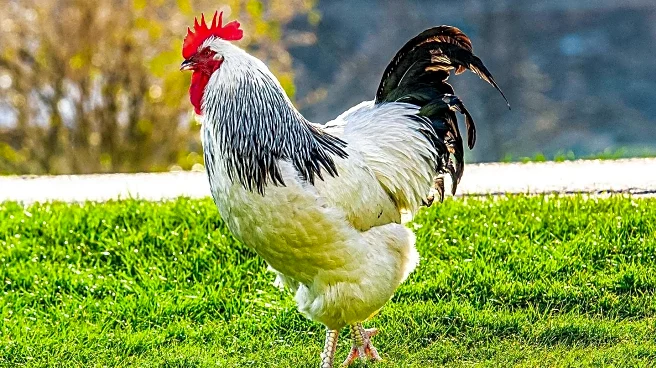What is the story about?
What's Happening?
An urban hen owner in Calgary, affiliated with CLUCK Canada (Canadian Liberated Urban Chicken Klub), has been served by local bylaw authorities for possessing livestock, specifically three hens. The owner was ordered to remove the hens, which has caused distress due to the fear for her pets' well-being. This incident highlights the ongoing tension between urban farming enthusiasts and municipal regulations that restrict livestock ownership within city limits. The bylaw enforcement reflects Calgary's stance on maintaining urban areas free from livestock, which is often seen as a measure to prevent potential health risks and maintain public order.
Why It's Important?
The enforcement of bylaws against urban livestock ownership in Calgary underscores the challenges faced by urban farmers and pet owners who wish to keep non-traditional pets. This situation is significant as it raises questions about the balance between urban agricultural practices and municipal regulations. Urban farming advocates argue that keeping hens can contribute to sustainable living and local food production, while municipalities often cite health and safety concerns. The outcome of this enforcement could influence future policy decisions regarding urban agriculture and pet ownership, potentially affecting similar communities across North America.
What's Next?
The urban hen owner and CLUCK Canada may seek to challenge the bylaw enforcement, potentially leading to public discussions or legal actions aimed at revising municipal regulations. Advocacy groups might increase efforts to lobby for more lenient policies that accommodate urban farming practices. The situation could also prompt other cities to review their own bylaws concerning urban livestock, possibly leading to a broader debate on sustainable urban living and the rights of pet owners.
Beyond the Headlines
This incident highlights the cultural and ethical dimensions of urban farming, as it touches on the rights of individuals to engage in sustainable practices within city environments. It also raises questions about the ethical treatment of animals in urban settings and the responsibilities of pet owners to comply with local laws. The broader implications could include shifts in public attitudes towards urban agriculture and increased awareness of the benefits and challenges associated with keeping non-traditional pets.
















